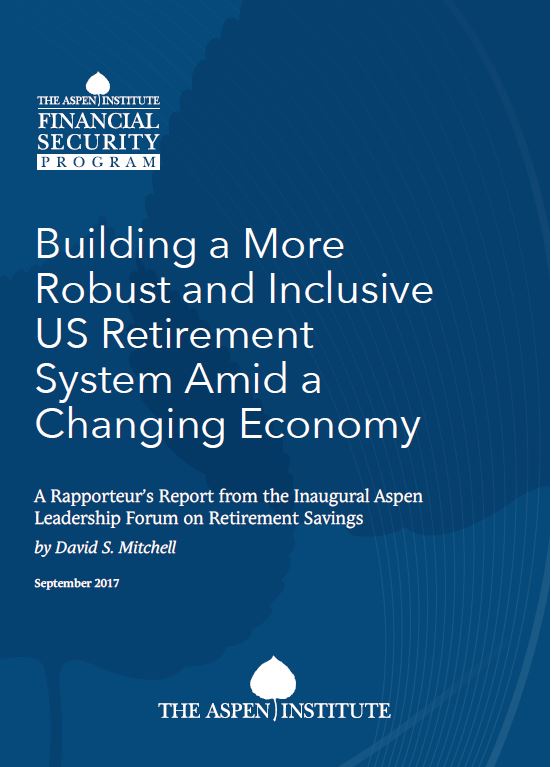The United States retirement system is undergoing profound changes. Low interest rates, new policies around fiduciary duty, and the emergence of new financial technologies are among the many disruptions reshaping the retirement marketplace. How today’s leaders—in government, business, academia, and the nonprofit sector—react to these changes will shape the system that the next generation inherits.
It is with that in mind that the Aspen Leadership Forum on Retirement Savings held its first annual gathering. Over two days in April, 62 policymakers, business executives, researchers, and advocates met in Middleburg, Va., to discuss how to build a more inclusive and effective savings system.
Participants grappled with a host of questions, not least of which was: Why is the US retirement system serving some Americans so much better than others? Forum participants identified five major reasons:
- The coverage gap. Millions of Americans have no easy way to save for retirement through work. While Forum participants disagreed about the exact size of the gap and how best to measure it, most agreed that it was a fundamental shortcoming of the current system.
- Widespread financial instability. Those struggling economically in retirement are usually those who struggled economically during their working life. Given that financial instability among American workers is rising, now reaching well into the middle class, the stress on the country’s retirement system will likely intensify going forward.
- Increases in longevity. Even as workers face economic headwinds, they generally are enjoying longer lifespans—and—thus longer retirements. This poses various challenges to the retirement system, including the growing and urgent need for “lifetime income” options.
- The evolving social contract. Some retirement-system risks that were shared in traditional pension models now rest solely on the shoulders of individuals. This risk shift has occurred in tandem with a decline in trust in institutions and elites, making attempts to reshape the social contract more difficult.
- Lack of political will. The challenges facing the American retirement system are subtle and slow developing, more chronic disease than headline-grabbing epidemic. This makes galvanizing action on the part of politicians all the more complicated.
The task of overcoming these five challenges is daunting, but Forum participants expressed cautious optimism about the following ideas:
- Rethinking the role of employers. Employers have been the linchpin of the US private retirement system since its inception. But many employers—especially small business owners—feel that they do not have the resources or know-how to offer a plan. One way to address this would be to reduce plan sponsors’ fiduciary responsibilities. Another idea: a “soft” employer mandate that would provide the government or a third party access to an employer’s payroll for automatic enrollment and deduction purposes. Whether these policies could be combined in a politically palatable way, as they have been in the United Kingdom and some states, remains to be seen.
- Ensuring lifetime income. Forum participants generally agreed that lifetime income products are a promising if complicated way to make retirement nest eggs last. Plan sponsors, policymakers, and private sector disruptors can all play a role in achieving this goal.
- Meeting a broader range of financial needs. Some attendees argued for leveraging the unique strengths of the current retirement system—broad reach and robust competition around customer service and fees—to combat other threats to financial security, such as short-term shocks, income and expense volatility, and consumer debt.
- Strengthening the 401(k). An alternative to comprehensive reform models that re-imagine the role of employers is to tweak the current system in proven—and, in some cases, long overdue—ways. This includes expanding the use of automatic enrollment and escalation, making the Saver’s Credit refundable, and establishing open multiple employer plans.
- Making plans more portable. Many employees cash out their workplace plans when they switch jobs because of the complexity involved in “rolling over” accumulated savings to a new plan. Making the rollover process simpler could reduce this major source of savings “leakage.” Any large-scale action on retirement reform will require trust, a willingness to experiment, and a sense of the greater good.
The Aspen Leadership Forum on Retirement Savings seeks to create a “brave space” that allows for these conditions to flourish, and the first annual convening went a long way towards achieving that end. Participants left the Forum energized and ready to work together to begin solving the financial challenges facing the country.


